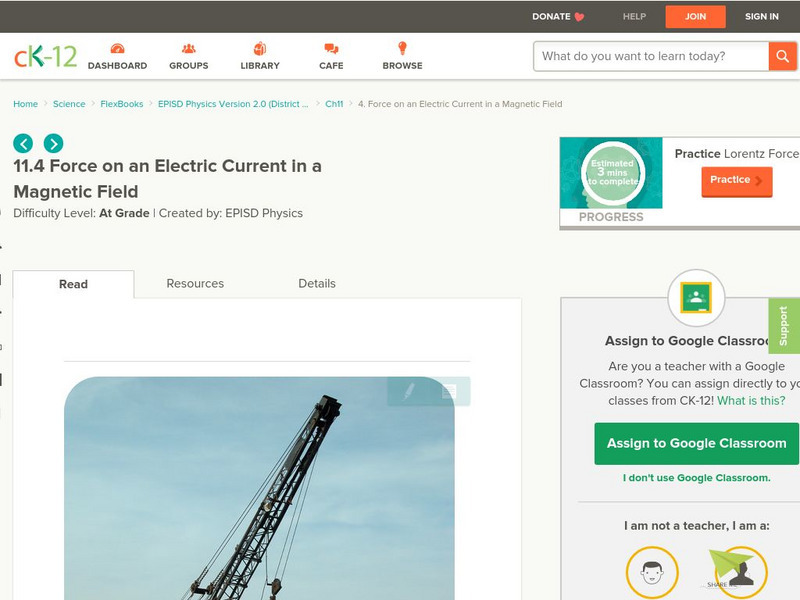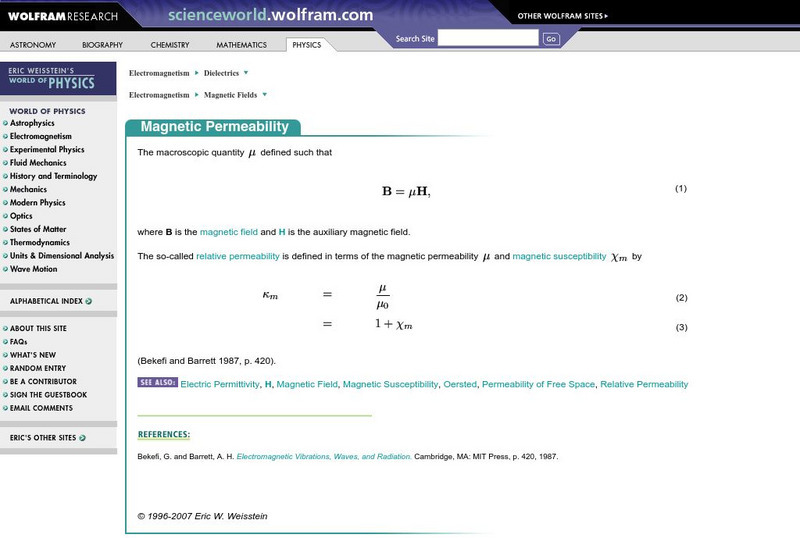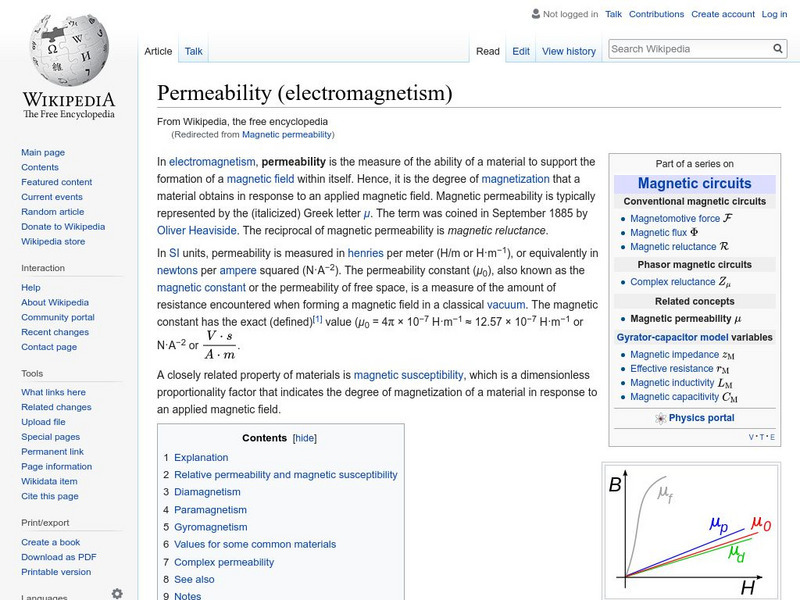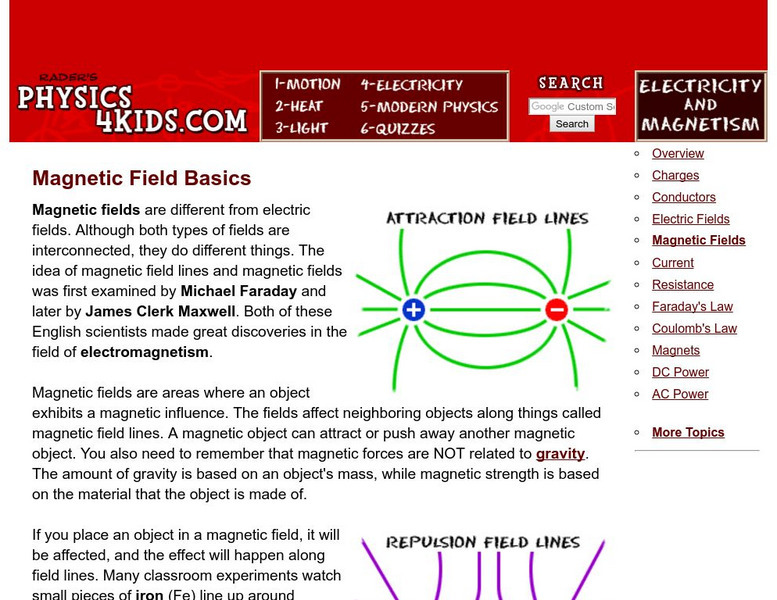The Wonder of Science
The Wonder of Science: Ms Ps2 5: Electric, Magnetic, and Gravitational Fields
Work samples, phenomena, assessment templates, and videos that directly address standard: MS-PS2-5: electric, magnetic, and gravitational fields.
CK-12 Foundation
Ck 12: Physics Simulation: Field Lines
[Free Registration/Login Required] Understand the size and shape of the Earth's magnetic fields, explore the magnetic fields of other planets using this interactive simulation. A PDF worksheet and a video tutorial are also available. [2:35]
CK-12 Foundation
Ck 12: Force on an Electric Current in a Magnetic Field
[Free Registration/Login may be required to access all resource tools.] Students learn how a magnetic field affects moving charged particles or an electric current carried by a wire.
Alabama Learning Exchange
Alex: The Magnetic Maglev Train
This is a hands-on, inquiry-based lesson that includes three magnetic stations in which students or small groups rotate in order to test and discover different magnetic properties and then use their knowledge to build a Maglev Train...
Concord Consortium
Concord Consortium: How Electrons Move
Being able to control the movement of electrons is fundamental for making all electronic devices work. Discover how electric and magnetic fields can be used to move electrons around. Begin by exploring the relationship between electric...
Khan Academy
Khan Academy: Using the Right Hand Rule
Physicists use a hand mnemonic known as the right-hand rule to help remember the direction of magnetic forces. The right-hand rule is based on the underlying physics that relates magnetic fields and the forces that they exert on moving...
Khan Academy
Khan Academy: What Is Magnetic Force?
An article defining what magnetic force is and how to calculate it.
Khan Academy
Khan Academy: What Are Magnetic Fields?
Learn what magnetic fields are and how to calculate them with this reference page.
Stanford University
Stanford University: Magnetic Force Microscopy
Help students learn how scientists use powerful tools to visualize, study and control materials at the nanoscale.
Other
Stanford University: Probing What You Can't See
Students will investigate magnetic forces and poles using a refrigerator magnet.
NASA
Nasa Space Place: Sunspots and Solar Flares
Learn about sunspots and solar flares and the effects of solar activity on Earth.
Khan Academy
Khan Academy: Measure the Earth's Field!
You can use a bar magnet and a compass to get a rough idea of the strength of Earth's magnetic field. Read this article to find out how!
Wolfram Research
Wolfram Science World: Magnetic Permeability
This site defines magnetic permeability in terms of magnetic fields, and relates magnetic permeability to magnetic susceptibility and relative permeability.
Wikimedia
Wikipedia: Permeability
This site from the encyclopedia Wikipedia provides a concise definition of magnetic permeability given in terms of magnetic flux density and magnetic field strength.
PBS
Pbs Teachers:magnetic Storm: Visualizing Magnetic Fields
Explore the magnetic fields around different shapes of magnets.
National High Magnetic Field Laboratory
Magnet Academy: Seeing Magnetic Field Lines
Compasses and special metal filings help you "see" the invisible force of magnetic fields. [2:25]
National Institutes of Health
Niehs: Kids' Pages: What Are Electric and Magnetic Fields?
Informational fact sheet on electricity with emphasis on electric and magnetic fields.
Physics4kids
Physics4 Kids: Electricity and Magnetism: Magnetic Fields
Explains magnetic fields, how they differ from electric fields, and attraction and repulsion.
Treehut
Suzy's World: Magnetism: Why Does a Compass Point North?
This fact sheet from Suzy's World and Suzy Cato explores how magnetism works, including "why a compass points north." Content includes fun facts, an experiment, and the ability to make your own compass.
Oswego City School District
Regents Exam Prep Center: Permeability
A good visual introduction to permeability, comparing the magnetic permeabilities of air and iron. This site provides a good conceptual introduction to this topic.
Integrated Publishing
Integrated Publishing: Theories of Magnetism
This site from Integrated Publishing provides three different examples of theories of magnetism.
Tech Target
Whatis.com: Permeability
This resource defines magnetic permeability and then describes how it is used to classify materials as diamagnetic, paramagnetic, or ferromagnetic.
Other
Science Toys: Magnetism
This site describes how to make several toys with magnets. It also gives an explanation of how they work and where to get the right kind of magnets.
NASA
Nasa: Imagine the Universe: Welcome to the World of Multiwavelength Astronomy!
This Imagine the Universe site provides an introduction into the multiwavelength universe and astronomy. Site provides graphics, links to a quiz, facts on this topic as well as teacher resources.




















